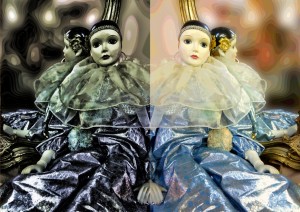Janet Harrison: There is so much that I like about your poem Grimoire, but I want to start with the title. I always pay attention to titles, and this one seems particularly apt. I am curious what “grimoire” means to you.
Kristin Camitta Zimet: A textbook of spells, usually black magic. A grimoire holds a dangerously strong set of incantations. This poem of course contains both black magic and white.
I love that you can hear the word grim inside the title, with twin connotations of horrible and unyielding. Actually, though, grimoire derives from the same source as grammar—the framework for language, the rigid rules of engagement with reality. This child learns a language that deforms her. Words—ordinary words—have enormous power to shape us. Especially the words we apply to ourselves.
JH: How did this situation spring to mind?
KCZ: The girl in the poem is not me, nor is she a particular woman I know. Nevertheless I never had the sense of making her up; I recognized her as real.
As I write a poem, a whole range of experience, conscious and not, personal and not, becomes available to me. At least one element lurking in my mind this time was a scene in C. S. Lewis’ book Voyage of the Dawn Treader. Lucy, a little girl, has to go upstairs all by herself in a Magician’s house and open his spellbook. She is supposed to find a counterspell to disenchant invisible people. But she sneaks in a spell to overhear what her friends say about her (a different sort of making visible). The consequences are sad.
JH: Interesting. One of the things I admire is the way you maintain tension in this poem. For example, you start out with a set of words, but we don’t know what they will mean. Gradually in the course of the first stanza, we discover the enspellment. Then the second stanza starts out with “the counterspells,” but we don’t know what they are until the last possible moment.
The poem winds up being a beautiful mirror. How conscious were you of this form as you created it?
KCZ: It was absolutely deliberate. When I write a poem, I seek out the unique structure that fits the developing meaning. Every poem deserves its own inherent form.
This poem stretches between two word sets, each of them separated by slashes because words, one by one, can be slashes or blows. The form of the poem is a mirror—a highly magical object. A baby is absorbed by a mirror, one of the first ways to define self; an adolescent gives a mirror devastating power.
In the first stanza the child becomes the mirror of the way she is treated. In the second half she becomes the mirror of an alternate language. So each half of the poem is a small mirror, within the larger mirror-structure of the whole.
I am exploring this theme visually in photography too. For example, I made a photograph called “Night and Day.” Here the same female doll is inverted, back to back with herself. Each doll also looks into a mirror, so two outer mirrors enclose the image. The bright shapes in the mirror on the right are sinister wolf shapes in the mirror on the left.

Copyright 2013 by Kristin Camitta Zimet. All rights reserved
JH: These are important themes. I could pin this poem up and read it every day. It shows how deeply shame exerts control, whether one is aware of it or not.
KCZ: I mean this though as a poem of hope. There is a way back out of the deepest shame.
JH: It seems to be important to you that it is a sister or a mother—a female voice—that does the shaming.
KCZ: Yes, I believe that a girl uses her sister and mother as her mirrors. A man may also belittle and hurt us, but the language women use among themselves may do deeper damage. Women are vulnerable to other women because they open to them on an emotional level.
JH: A broken mirror and a crazy quilt appear in the second stanza. Can you talk about them?
KCZ: To let go of a bad self-image, a cruel construct, is not enough. Break a mirror, and you get shards—pointed, narrow, sharp. Each piece reflects too little, and will cut you. Making a new construct is vital.
I love crazy quilts. They break the rules of quilting, the bounds of structure. The first stanza is all about binding, tying down, restricting. The second is about fitting the scraps together to form a single free-form, open design.
JH: Is this why her voice is “in chorus”?
KCZ: Yes. When an old pattern is smashed, there is more than one self, more than one inner voice, that emerges. Each of these must be heard. Each must find a place in the renewed personality.
You might also interpret the chorus another way. The story of this one woman is the story of many women, recovering alike.
JH: This poem appears in an issue on sexuality, but it includes so much more.
KCZ: The deepest and most specific effects of the spell are upon the girl’s sexuality. It stifles her ability to move responsively, swivel her hips, bare her breasts, connect with her lower body. The spells are a form of undressing, and they sound loudest in bed.
Successful sexuality depends a great deal on self-love. To trust your own desirability, to choose a partner who affirms you, and to allow yourself to feel and reciprocate, all depend on that. Are there wider implications than sex? Of course.
JH: Is there anything else you want to say?
KCZ: Of the many poems I’ve written, this is one of my favorites. Partly because it is peculiar. Partly because as a poet, language feels so potent to me. I am increasingly unwilling to be party to conversation—personal or communal—in which people are reduced to a catalog of wrongs and incapacities. I am not referring to therapy. I mean conversation in which people nurse the negative.
As a mother, a poet, a friend, a citizen, I want always to be careful what spells or counterspells I speak.
JANET HARRISON presents poetry Monday mornings on the “Winners and Losers” radio show on WSHC, broadcasting from Shepherdstown, West Virginia. She is a candidate for a Masters in Fine Arts with a concentration in poetry in the Brief Residency Program of Spalding University.


Pingback: Grimoire | Rkvry Quarterly Literary Journal